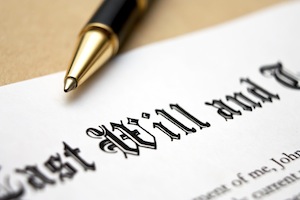Thinking about your own death is often unpleasant yet unfortunately necessary.
When you die there are a certain set of rules that dictate how your assets will be distributed to your heirs. Those rules are set by your state’s estate tax laws.
If you don’t want your assets to go to the state and likely take years to be doled out to your heirs then you need a will. Some people may also need a trust, but a will and a trust are two different legal issues.
Finding out the difference can be pretty confusing and having the wrong type of legal protection for your assets can be a catastrophic estate planning error.
How are a Will and Trust Different?
These two critical pieces of estate planning are similar, but different, and knowing the difference is key.
What is a Will?
A will is a legal document that lets you determine who gets what specific assets you have when you die. It can also tell the courts who becomes legal guardian over any of your children. Your will names an executor of your estate that will be responsible for a significant amount of work after you die like giving your heirs your property, paying off any creditors you had at the time of your death, and filing tax paperwork.
A will is the most critical piece of estate planning and many people live without one for years, assuming they will live longer. Since we never know when our last day is it is really important to go ahead and get one in place today. You can always update it later.
The only thing a will cannot distribute to your heirs is financial accounts that have beneficiary designation information assigned to them.
For example, your Roth IRA broker will always ask you during the account opening process who should be the designated beneficiary to get your account if you die. Your will cannot give different directions that what is on the beneficiary designation of your financial accounts.
What is a Trust?
 A trust is a separate legal entity that holds assets that you determine. They can be used to avoid estate tax or to make sure specific members of your family (like grandchildren) are given specific assets.
A trust is a separate legal entity that holds assets that you determine. They can be used to avoid estate tax or to make sure specific members of your family (like grandchildren) are given specific assets.
There are two main types of trusts, and each type has several specific purpose trusts that fall under it.
The two types are irrevocable and revocable. The former means once the trust is in place you can’t change anything without permission from the beneficiary. The latter means you can revoke the trust whenever you want as long as you are alive.
The Difference Between a Will and a Trust
Critical to know: a trust does not replace a will.
Trusts deal with specific assets. Wills deal with everything else and will make sure your estate plan is put into action as you wanted it.
Here are three easy steps to understanding the difference:
- Everyone needs a will.
- Some people with specific situations will use a will and a trust.
- No one will just use a trust.
How Important are Wills and Trusts to Have for Estate Planning?
Living and dying without a will in place is going to leave your heirs with a huge problem to face without you.
Without a will your estate will be put into probate court will it will likely languish for months of years. Probate courts are the government’s only way of determining who gets what from your estate. That means people can come forward to make claims, no matter how outlandish, about your assets. Just like any court case your heirs have to show evidence about what they believe you wanted and the whole thing turns into a gigantic mess.
This is especially difficult on your heirs because they are also dealing with the emotional and financial loss of you being in the family.
Losing a loved one is already difficult enough, but having to fight over what is left in court is especially draining. Plus, if you were an income earning member of your family they might actually need those financial assets of yours in order to pay bills and avoid losing the house.
Final Thoughts
Going without a will is one of the worst financial decisions you can make in your life.
It shows a lack of forethought — we’re all going to die at some point — and really hurts your heirs. Your wishes on who in your family gets a specific item can be ignored (and argued over in probate) and overall it just leaves gigantic mess for everyone else to clean up.
Get a will, even a basic one, today to save your heirs these problems.
I’ve had family members of mine that have died without a will, and we can call it interesting. Basically, we went through the house and just collected all of the pictures and personal items before the state claimed the house. The only good thing about that situation is that we did’t inherit all of the medical bills from my grandfathers cancer. A will and a trust is definitely a must, especially if you don’t want your kids to argue over your belongings.
Interesting indeed. I can only imagine what all of you were going through emotionally as you went through the house.